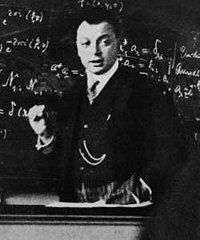
PsiQuaSP–A library for efficient computation of symmetric open quantum systems
Sign Up to like & getrecommendations! Published in 2017 at "Scientific Reports"
DOI: 10.1038/s41598-017-16178-8
Abstract: In a recent publication we showed that permutation symmetry reduces the numerical complexity of Lindblad quantum master equations for identical multi-level systems from exponential to polynomial scaling. This is important for open system dynamics including… read more here.
Keywords: quantum; quantum systems; system; multi level ... See more keywords

Comment on "spontaneous breaking of permutation symmetry in pseudo-Hermitian quantum mechanics"
Sign Up to like & getrecommendations! Published in 2017 at "Physical Review A"
DOI: 10.1103/physreva.96.046101
Abstract: Li and Miao [Phys. Rev. A 85, 042110 (2012)] proposed a non-Hermitian Hamiltonian that is neither Hermitian nor $PT$ symmetric but exhibits real eigenvalues for some values of the model parameters. In order to explain… read more here.
Keywords: comment spontaneous; permutation symmetry; spontaneous breaking; mechanics ... See more keywords

On the breaking of μ–τ permutation symmetry
Sign Up to like & getrecommendations! Published in 2017 at "International Journal of Modern Physics A"
DOI: 10.1142/s0217751x17420027
Abstract: In view of the observation of a relatively large ????13, one has to break the μ–τ permutation symmetry properly which would otherwise result in a vanishing ????13 (as well as ????23 = π/4). Motivated by… read more here.
Keywords: breaking permutation; physics; symmetry breaking; symmetry ... See more keywords

Modern State of the Pauli Exclusion Principle and the Problems of Its Theoretical Foundation
Sign Up to like & getrecommendations! Published in 2021 at "Symmetry"
DOI: 10.3390/sym13010021
Abstract: The Pauli exclusion principle (PEP) can be considered from two aspects. First, it asserts that particles that have half-integer spin (fermions) are described by antisymmetric wave functions, and particles that have integer spin (bosons) are… read more here.
Keywords: principle; pauli exclusion; symmetry; permutation symmetry ... See more keywords